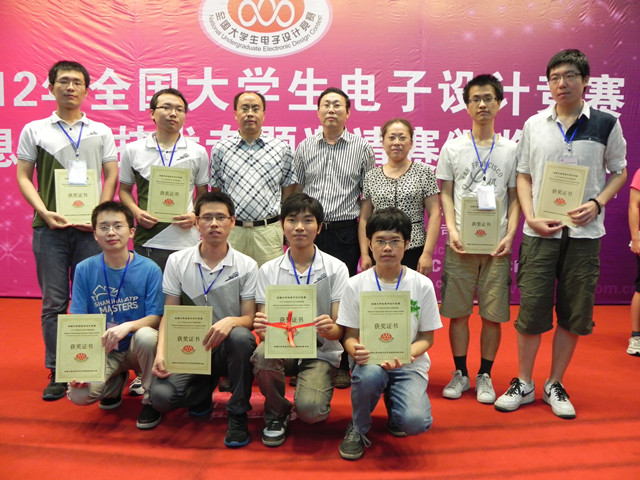School of Information and Electronics

The School of Information and Electronics of Beijing Institute of Technology was formerly known as the Department of Electronic Engineering (the fifth department) of Beijing Institute of Technology. Originally founded in 1953 as the Radar Design and Manufacturing Department, it became the Department of Radio Engineering in 1956, was renamed the Department of Electronic Engineering in 1971, and was finally restructured into the School of Information and Electronics (the fifth school) in 2008.
The School of Information and Electronics was among China’s first educational and research institutes in radar, remote control, and telemetry technologies, and was also one of the major institutes aided by the former Soviet Union. The school educated the first professionals in radar technology for the newly founded People’s Republic of China. Some of them become outstanding experts, such as Ke You’an, Mao Erke, Wang Xiao’mo, and Wu Yirong. The latter three are fellows of the Chinese Academy of Sciences or Chinese Academy of Engineering. The school participated in the scientific verification of China’s earliest phased array radars initiated by Fellow Zhang Zhizhong. Some of the team members, such as Zhang Guangyi, Ben De, and Mao Erke, also became fellows of the Chinese Academy of Science or Chinese Academy of Engineering. In the past 60 years, the school has produced more than 14,000 graduates.
The school produced China’s first television transmitting equipment, first TV channel, first low-altitude radar altimeter; and three fellows, two ministers, three presidents of major universities, several generals, and numerous senior professionals. These achievements contribute to the high-quality discipline construction and education. The school has two primary disciplines: information and communication engineering and electronic science and technology. Information and communication engineering, led by Wang Yue (Fellow of Chinese Academy of Science and Chinese Academy of Engineering), Mao Erke (Fellow of Chinese Academy of Engineering), and Professor Kuang Jingming (a Discipline Review Group convenor of the State Council), is the national primary discipline and took the fifth place in the nation-wide discipline appraisal in 2007. The electromagnetic field and microwave technology is the major discipline in Beijing, and the electric and electronic laboratory is one of the first national electric and electronic Experimental Teaching Demonstration Centers.
The school has 193 teachers, among which 1 is a fellow of the Chinese Academy of Science and Chinese Academy of Engineering, 1 is a fellow of the Chinese Academy of Engineering, 2 are Cheung Kong Scholars, 28 are professors, 1411 hold bachelor’s degree, 620 hold master’s degree, and 266 hold doctor’s degree. The school has an innovation team in new radar and real-time information processing designated by the Ministry of Education and two national defense technology innovation teams. The innovation team of the Radar Technology Institute was awarded National Outstanding Educational Organization and Outstanding National Defense Technology and Engineering Innovation Team by the Ministry of Education and Ministry of Personnel.
The school has more than 14,000 m2 of floor used for education and research, among which more than 6,000 m2 of floor area is used for education. The school also has 6752 sets of laboratory devices, worth of more than RMB114 million. Among the laboratories of the school, the Satellite Navigation and Electronic Information Technology Laboratory is designated by the Ministry of Education as a key laboratory; the Multivariate Information System Laboratory is designated by the Ministry of Defense as a key laboratory; the Signal Acquisition and Processing Laboratory is a national specialized laboratory, and the Military Information Collection, Transmission, and Processing Laboratory is a 211 Project laboratory.
The achievements of the school in recent years include: 1 national-level special prize in teaching, 1 national-level first prize in teaching, and 1 second prize; 2 national quality courses, 1 national quality network education course, 1 national bi-lingual demonstration course, 1 Ministry of Education-Intel quality course, 1 national quality curriculum, 2 national teaching groups, 1 national teacher, 6 municipal quality course, 8 municipal quality curricula, 4 municipal outstanding teachers, 2 municipal outstanding groups, and 7 provincial and ministry level first teaching prizes. In 2010, 10 students of the school won the first prizes in national academic competitions, and more than 100 students won municipal prizes.
The school focuses on radar technology, information security and antagonism, signal processing, communication system, electromagnetic field and microwave technology, microelectronics technology, bioinformatics, circuit and system, complex information system, electronic warfare, satellite navigation, space remote sensing, and space telemetry. The school has won 8 national science and technology awards and more than 30 provincial and ministry level awards in these fields.
In 2009, the school invested more than RMB120 million in scientific research and the investment is expected to reach RMB150 million in 2010. The school has won more than RMB6.5 million of funding from National Science Foundation of China, published nearly 50 SCI theses, and has been granted with more than 50 patents. The school won the first invention award in national defense technology in 2009 and is applying for the national invention award.

